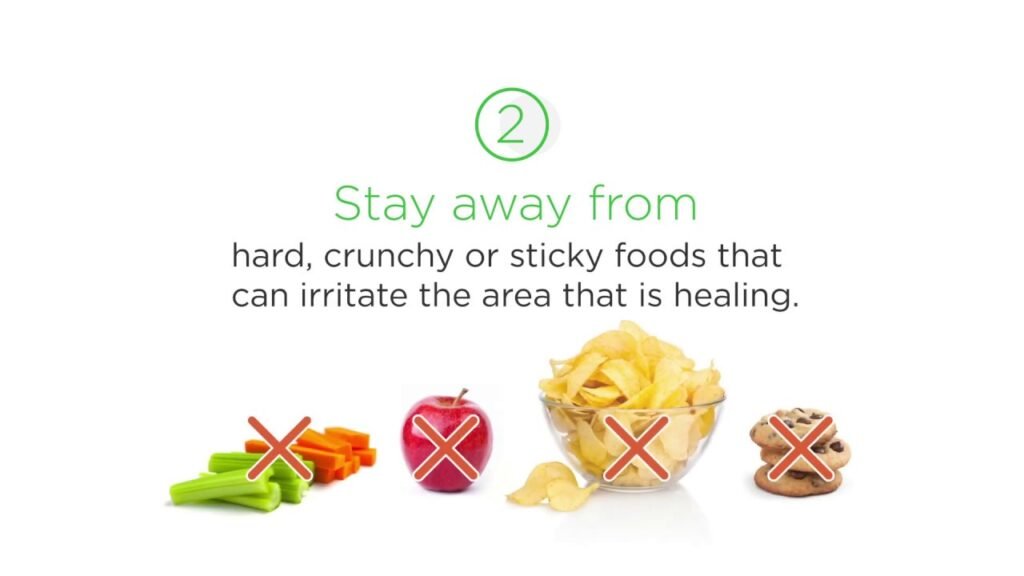Foods to Avoid Post-Oral Surgery

Are you recovering from oral surgery and wondering what foods to avoid? It's important to be mindful of your diet to promote healing and prevent complications. Certain foods can irritate the surgical site or cause discomfort, so it's best to steer clear of them during your recovery. In this article, we'll outline the top foods to avoid after oral surgery, so you can ensure a smooth and successful healing process.
When will I be able to eat regular food following oral surgery?
After oral surgery, it is best to stick to soft foods for the first few days to allow your mouth to heal properly. However, by day 7 and beyond, you can gradually introduce normal foods back into your diet. This is typically when the extraction site is healing well and you have the green light from your dentist or oral surgeon.
During the initial days following oral surgery, it is important to avoid hard, crunchy, and sticky foods that may disrupt the healing process. Opt for soft foods like yogurt, mashed potatoes, and smoothies to give your mouth a chance to recover. As you progress into the second week post-surgery, you can slowly incorporate normal foods back into your meals, ensuring that you chew carefully and avoid putting too much pressure on the extraction site.
By day 7 and beyond, you should be able to enjoy a wider variety of foods as your mouth continues to heal. Remember to listen to your body and avoid any foods that cause discomfort or irritation. It is important to follow your dentist or oral surgeon's instructions and gradually transition back to a normal diet to ensure a smooth and successful recovery.
What are the foods that should be avoided with stitches in your mouth?
When you have stitches in your mouth, it's important to avoid certain foods that could cause irritation or damage to the surgical site. Foods that are tough or crunchy, like pizza, rice, popcorn, and hamburger, can be difficult to chew and may get stuck in the stitches. These types of foods can also be painful to eat and may increase the risk of infection.
Additionally, it's best to steer clear of spicy and acidic foods while you have stitches in your mouth. Spicy foods can be irritating to the sensitive tissues in your mouth, while acidic foods can cause discomfort and potentially slow down the healing process. Opting for softer, bland foods that are easy to chew and swallow can help promote healing and make the recovery process more comfortable.
By avoiding tough or crunchy foods, as well as spicy and acidic foods, you can help ensure that your stitches heal properly and without complications. Choosing softer, gentler options will not only be more comfortable for you but will also support the healing process and promote a speedy recovery. Remember to follow your healthcare provider's instructions and stick to a diet that is gentle on your mouth until your stitches are fully healed.
What is the best thing to drink after oral surgery?
After oral surgery, it's best to stick to clear liquids like water, herbal tea, and broth. These options are gentle on the healing tissues in your mouth and won't irritate the surgical site. Plus, staying hydrated is crucial for the healing process.
Avoid acidic or carbonated beverages, as they can sting or cause discomfort in your mouth. Stick to room temperature or cold liquids to help soothe any swelling or discomfort. Remember to sip slowly and avoid using a straw to prevent any complications or dislodging of blood clots.
If you're looking for a flavorful option, try infusing your water with slices of cucumber, lemon, or mint. These additions can help make hydration more enjoyable without compromising your healing process. Remember to consult with your dentist or surgeon for personalized recommendations based on your specific procedure.
Steer Clear: Foods to Skip After Oral Surgery
After oral surgery, it is crucial to avoid certain foods that can hinder the healing process and cause discomfort. Steer clear of hard and crunchy foods, such as nuts and chips, to prevent any damage to the surgical site. Additionally, acidic and spicy foods, like citrus fruits and hot sauces, should be avoided to prevent irritation. Stick to soft, easy-to-chew options like yogurt, mashed potatoes, and smoothies to promote a speedy recovery and minimize discomfort. By being mindful of what you eat, you can ensure a smooth healing process after oral surgery.
Healing Diet: What Not to Eat After Oral Surgery
After undergoing oral surgery, it is crucial to be mindful of what you eat to aid in the healing process. Avoiding hard and crunchy foods, such as nuts and chips, can prevent irritation and damage to the surgical site. Additionally, steering clear of spicy and acidic foods can help prevent discomfort and inflammation. Opting for soft, easy-to-chew foods like yogurt, mashed potatoes, and smoothies can promote healing and reduce the risk of complications. By being cautious of what you eat after oral surgery, you can ensure a smoother and speedier recovery process.
In order to promote a smooth and successful recovery after oral surgery, it is essential to be mindful of the foods you consume. By avoiding hard, crunchy, spicy, and sticky foods, you can protect your healing process and prevent any complications. Instead, opt for soft, easy-to-chew options like smoothies, yogurt, mashed potatoes, and soups to nourish your body without causing discomfort. Remember, your diet plays a crucial role in your recovery, so choose wisely to ensure a speedy and comfortable healing process.